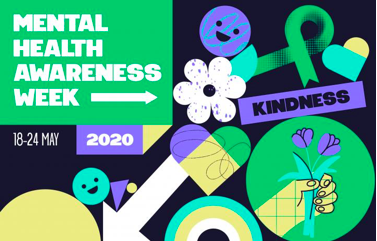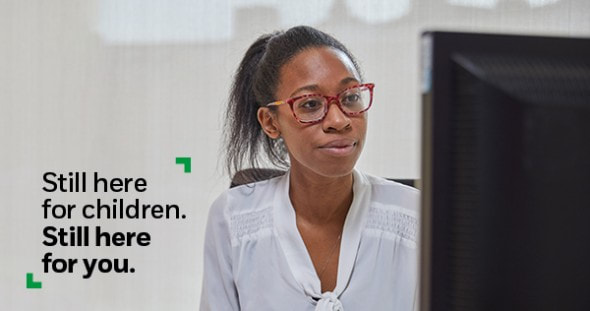 Mental Health Awareness Week is focusing on the power and potential of kindness. Research shows that protecting our mental health is going to be key to us coping with and recovering from the coronavirus pandemic. Kindness can be defined as "Doing something for yourself and others, motivated by genuine desire to make a positive difference." We know from research that kindness and our mental health are deeply connected. Research also shows that kindness can help with problems due to isolation and creates a sense of belonging. It helps reduce stress, brings a new outlook on a situation and deepens friendships. Kindness to ourselves is also very important. It can help boost our self-esteem. Kindness can even improve feelings of confidence and optimism. To find out more about Mental Awareness Week, see the link below: www.mentalhealth.org.uk/campaigns/mental-health-awareness-week Here are some activities you might like to complete with your child on this theme: taking_turns_.pdf for younger pupils paper_chain_friends.pdf for Key stage 1 pupils marvellous_medals_.pdf for older pupils
8 Comments
The onset of the coronavirus means we are having to deal with uncertainties and unknowns very quickly and with little preparation. Being at home for long periods of time and not being able to see friends and visit familiar places is confusing. Despite the current pandemic, children will still need and want to play. Playing helps children manage their emotions and make sense of their situation. During times of uncertainty it:
· helps to give children a feeling of normality and joy during an experience of loss, isolation and trauma · helps children to overcome emotional pain and regain control over their lives · helps them make meaning of what has happened to them, and enable them to experience fun and enjoyment · offers children an opportunity to explore their own creativity. Even if children may sometimes seem distressed, play is the healthy way for children to come to terms with news and it provides parents and carers with an insight as to how they are feeling. Here are a list of top tips to help support play at home: Time · If children are absorbed in play, it is okay to leave them to it. Try to resist the urge to start a specific activity or stepping in to help, unless you are asked to. · Having time to watch children play can help you find out a bit about what they enjoy doing and give you a clue to how they may feel about the situation they are in. · Try not to worry if children say they are bored, that’s okay. Many childen have become used to their time being filled and the experience of boredom is unusual. But it’s a natural and important experience that we often see before a period of creativity. · Make the most of your time outside by valuing play. As much as they will enjoy long walks and cycling, children get most of their physical activity from playing. Scooting, exploring, jumping and climbing on walls can still happen within the official physical distance guidance – children will need some gentle guidance with this. Space · There are lots of things around the house that encourage imagination and creativity. Allow children to play with things like cardboard boxes, old sheets, pots and pans. · Make a place to play – using items such as a cardboard box, sheets to build a small den or cushions – that allows children to be quiet and calm. This is a normal way to for them to come to terms with what is happening. · Try to allow for noisier and even destructive play. Children might want to play fight with their siblings, destroy something they have created, or hit things to make a noise. Acting like this helps them to vent frustration and understand what is happening. Permission · Remember that older children still need room and space to play too. They may be boisterous or might enjoy doing things they did when they were younger. This can give them a sense of security. · Try to let children decide how and what they are playing. Some things may be hard or upsetting to watch, but fantasy play helps children to make sense of and work through difficult and distressing issues. · Try not to stress too much if your children are playing alone. When playing alone, children begin to recognise their own emotions, feelings, and thoughts, as well as how to control them. They are also learning to feel comfortable with being by themselves and learn ways to manage their boredom on their own. · Through playing children experience a range of emotions including frustration, determination, achievement, disappointment and confidence, and through practice, can learn how to manage these feelings. · Focus on play ideas without rules or that don’t need a specific skill. These are fun for family members of all ages and will help pass the time in a playful way. For ideas, take a look at our indoor play section. Please see below link to activities shared by the royal college for paediatric and child health. https://www.rcpch.ac.uk/resources/stay-home-activities-children-young-people Avanti’s daily yoga sessions launched last week. They are hosting free online yoga classes, Monday-Saturday, 10am-10:30am on YouTube, open to all! The classes are designed for people of all abilities and are live and recorded so can be accessed any time. We want to share this offering with everyone, so please feel free to offer this to your colleagues, family and friends. To join the classes simply subscribe to Avanti Schools Trust YouTube page: https://www.youtube.com/channel/UCIKgipHTGr75vUPjsVQsj9g Each day they are posting the pose of the day and its health benefits on their Instagram page, click here to see those! https://www.instagram.com/avantischoolstrust/ Dear Parents and Carers, We continue to hope that you and your families are well and coping with the current situation as best you can. It is certainly fair to say that little could have prepared us for what has happened over the last month or two and we are very conscious of the wide- ranging challenges that the current lock down creates for us all. I am sure you will all be aware through the media about the increased concerns regarding the additional risks that being at home creates for children and adults who are victims of Domestic abuse. I’m quite sure that you will have seen the broadcasts on television aimed at those who are victims of domestic abuse. Please be aware that, if you are currently suffering in this way, support and help for you is available. The current lock down rules do not apply in the same way and there are options available to you. We have been asked to open the school up as a place of safety for victims to make a phone call for help. If you need to do this please come to school and ask for Sarah Marvin or Wendy Meardon. Let them know that you ‘need a place of safety to make a phone call’ and they will take you to the Heads office where you can contact the appropriate help. You may find the following numbers useful: Domestic Violence Hotline: 0808 2000 247 Childline: 0800 1111 Samaritans: 116 123 Mind: 0300 123 3393 Age UK: 0800 169 6565 La Leche League: 0345 1202918 (for mums struggling to get formula milk) There are lots of organisations out there offering help if it is needed. Please don't hesitate to call them. Best wishes, Sarah Marvin Please see attachment for the Online parenting support from Action for Children: Every parent needs a little help sometimes, and especially during lockdown. Action for Children are offering online parenting support for families with children aged 0-19. From where to go for help, to coping with challenging behaviours, to how to keep your children entertained at home - find advice and practical help here: parents.actionforchildren.org.uk Have a question about parenting? Action for Children’s online coaches are available for free, confidential 1-1 live chat. We’re here to listen and support you. Visit talk.actionforchildren.org.uk TALK flyer for Devon |
|
CONTACT
South Tawton Primary School, Tawton Lane, South Zeal, Okehampton, Devon, EX20 2LG Tel: 01837 840242 Email: admin@southtawton.org.uk |
© COPYRIGHT 2020 DARTMOOR MULTI ACADEMY TRUST. ALL RIGHTS RESERVED | Website design by brightblueC and Alex Thomas Design | Privacy notice


 RSS Feed
RSS Feed

